Table of Contents

The year is 1854, the industrial revolution has finally come to India, and with it, a colossal change in the way business is conducted. The sway from labour intensive to capital intensive means of production ushered in a new era of manufacturing. During this time, there was a dire need for workers who possessed sound technical knowledge to run these machines. And thus began India’s obsession with engineers. Here, I ask Sayantan Biswas should i drop out of engineering?
Fast forward to 2020 and the obsession continues. After almost a century and a half, one would imagine there’d be a lot of changes in the world and rightly so. Typewriters have been replaced by computers, landline telephones by smartphones, maps by GPS systems et al. But the way education is taught still remains the same. The same rote learning in the 1850s is still prevalent today. It is almost axiomatic that for progress to take place, old ideas have to make way for new ones. But that doesn’t stop every Indian mummy and papa from bludgeoning their kids with the notion – “Become an engineer and be set for life.” (Perhaps the 1.2 million engineers who fail to land a job every year didn’t get the memo.) That is why this regressive idea of following a rigid and traditional education system must be squashed.
This is precisely what Sayantan Biswas, founder of UniAcco, a company that acts as an accommodation platform where students can find reliable and hassle-free accommodation abroad, firmly believes in. We sit down for a quick tête-à-tête in his 24th-floor corner office, overlooking the Lower Parel concrete jungle.
Is having a degree important to you?
Absolutely not. For me, having a degree means two things. You have overbearing parents and you don’t have the faintest idea of what you want to do in life. I have never understood why people go chase degrees that have absolutely no connection to their jobs. This trend is too widespread. For instance, the best sales guy in my office holds an IIT degree. My marketing genius actually has an accounting background and my main IT guy graduated as a chemical engineer. Coming from an engineering background, I dropped out of IIT Roorkee, to follow my heart to become an entrepreneur. While my peers were busy studying for their semester exams, I started interning at several companies to find something I could really sink my teeth into. After mediocre stints in sales, digital marketing and even working at an NGO, I soon discovered that my strengths lied in management. No exam could ever bring me to this realisation. My decision to not go after a degree allowed me to explore new avenues and that, in turn, gave me an opportunity to start my business at an early age.
What do you think are the fundamental qualities required to be an entrepreneur?
There is no exact black and white answer to this question. A flamboyant person like Elon Musk and a subdued Steve Jobs have both made it big as entrepreneurs. I truly think that anyone armed with great tenacity and a penchant for getting things done at any cost can do incredibly well in life, let alone business.
Many people realise that their formal higher education won’t take them anywhere, but they still pursue it. What made you decide to take this audacious step of dropping out?
As much fun it was learning about the components of a diesel engine, I didn’t see the relevance it would have in my professional life. The moment I realised this, I dropped out. I credit my entrepreneurial achievements to my decision to drop out in order to escape from the shackles of limited knowledge. I never felt the need to conform to societies expectations. This might’ve worked for me, but I’m not sure dropping out is the best decision for everyone. That is why I don’t advocate the theory of dropping out just because the going gets tough. In fact, I encourage pursuing a degree if it helps someone grow in the field they definitely want to be in. But what gets my goat is people haphazardly pursuing degrees that act as a means to an end. I have seen several young students dive into a field they have no interest in only because of their friends. This “herd mentality” is detrimental to the future careers of students.
Fill the form to get FREE property consultation services.
[showmodule id=”7598″]
Don’t you think that having at least a Bachelor’s degree should be necessary?
Let’s get real, in today’s day and age, getting a bachelor’s degree is almost worthless. It is so common to have a bachelor’s degree that most companies don’t even bat an eye towards it. They want new. They want something different. But the Indian educational system is not equipped to serve this demand. Recently, there has been tremendous growth in the need for professionals having a background in data science. I reckon that India is aloof to this development as there are barely any institutions that teach this subject. Look at universities abroad like Harvard University. Most of their online classes are available to everyone, free of cost. The course material of actual Harvard students can be accessed by anybody who is interested. This is the norm for most universities in the US. They believe in the equal distribution of education. Apart from a handful of Indian universities, most of them do not provide this service.
Also Read: List Of Graduate Schools With Low GPA Requirements
So, do you think that Indian educational institutions aren’t abreast with international educational institutions?
Yes. I also have an issue with the unfair admission criteria set by universities everywhere. Say there are 250 seats in a top-notch university. Only the top 250 students get in. What happens to the 251st student? Does he or does he not deserve to go through?
At this point, a riled-up Sayantan gets off his chair and paces along his office while trying to force his thoughts back in some semblance of order. He says that, if by any chance you plan on dropping out of college to pursue your entrepreneurial dreams, step back and think for a second. What better place is there than a college to develop and foster your goals at limited risk? Colleges have an abundance of unique knowledge, resources, supportive peers, a competitive environment and experiential learning opportunities. If you still think this will not help you reach your entrepreneurial dreams, then, by all means, drop out.
Also read: Study in UK Requirements
But the entrepreneurial dream is not without its pitfalls, as Sayantan tells me.
He goes on to say that explaining your decision to drop out to your family and friends will be heartbreaking. They might not share your vision. I have gone through this phase and recall that my decision to drop out was not met kindly by my family, so much so, that they didn’t speak to me for almost six months. Such is the treacherous path of being an entrepreneur.
Furthermore, he states that you won’t have any recognised credential. There is no safety net anymore. No backup plan should your enterprise fail. Another major con of dropping out is paying back loans. With no company ready to hire you, there will be little to no influx of cash. Scampering to pay back loans can be tedious and time-consuming and will most certainly affect you in your endeavour to start your own business.
That being said, Sayantan exalts in the fact that he is finally doing something he loves; something most of his peers, working 9-5 jobs, can’t say. The freedom he has in his work life is unparalleled. He can explore his interests and leverage them into his business. Also, the fact that starting your work life almost debt-free helps.
Finally, dropping out is not a sure-shot path to success. I won’t sugarcoat, most people who have dropped out and made it big are an exception. Their perseverance and tenacity were the only things that kept them going. They did not give up on education but education institutions. It is crucial never to stop learning. The key is to follow your passions while in college, hone your skills, and if you think you’re ready to tackle the world with your skills and not a college degree then dropping out of college will be worth your while.











0 Comments